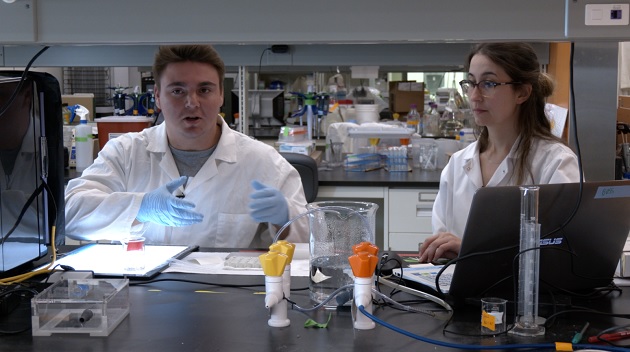NORTHAMPTON, MA / ACCESSWIRE / July 10, 2024 / Enbridge
University of Alberta program cultivates student interest in environmental education through summer research internships
The University of Alberta may have one of the best summer gigs going.
Forget office jobs. Since being launched in 2020, Indigenous students hired onto one of the research projects through the U of A's I-STEAM Pathways (I-STEAM) program could spend their summer studying water toxicity, regenerative agriculture, environmental policy or flood forecasting tools-just to name a few.
"Many of our interns are actually hired out of non-STEM-related fields of study," says Dr. Makere Stewart-Harawira, professor at Edmonton-based University of Alberta and original co-founder of the I-STEAM Pathways program. "They might be enrolled in a health or psychology program, but this internship offers an opportunity to explore an enormous variety of other fields in engineering, biology or agriculture."
The I-STEAM program is the first of its kind in Canada, and is dedicated to giving Indigenous students the opportunity to engage in environmental research, ideally leading them to consider it as a future career path.
"There is a real call in both the research community and within Indigenous communities to increase the number of Indigenous people in positions of authority in environmental policy," says Dr. Stewart-Harawira.
Open to students in their first year of undergraduate studies and upwards, I-STEAM matches students with carefully selected research projects and a dedicated mentor for a four-month paid internship over the summer.
Last year, the program hired 18 students to environmental research projects, up from 16 in 2022. While the upward trend is encouraging, the program's ability to accept research proposals and facilitate summer internships is entirely donor dependent.
In 2023, Alliance Pipeline donated $60,000 to the I-STEAM Pathways program as part of its commitment to communities. The funding facilitated internships for the program and contributed to research costs and student wages. After a 24-year span, Enbridge sold its ownership interest in Alliance to Pembina Pipeline Corporation in April 2024.
The research projects are not just confined to labs-they often have real-world impact.
Jordan Eleniak, a 2023 I-STEAM program participant and Metis student hailing from Lac La Biche, AB, developed a device that helps predict algae blooms during his internship. Eleniak is also the president of the U of A's Indigenous in STEM Students Association.
"Jordan's work is exactly the type of hands-on research that we get excited about," says. Dr. Stewart-Harawira. "I am constantly moved by the interchange of knowledge and witnessing as students build a passion and interest in their environment."
Dr. Stewart-Harawira, who is New Zealand Maori, arrived in Alberta in 2004 with the intention of spending "four or five" in Alberta, and ultimately to launch a program around Indigenous environmental education.
But 20 years later, she's still here, with I-STEAM Pathways programming running strong, thanks at least in part to the good work of her co-leads in the program, Navajo environmental engineer Dr. Chelsea Benally and biological scientist Dr. Greg Goss, both at the University of Alberta and equally dedicated to the program.
"I guess I've just been having so much fun," she says.

TOP PHOTO: I-STEAM program participants work on their projects at the University of Alberta.
View additional multimedia and more ESG storytelling from Enbridge on 3blmedia.com.
Contact Info:
Spokesperson: Enbridge
Website: https://www.3blmedia.com/profiles/enbridge
Email: info@3blmedia.com
SOURCE: Enbridge
View the original press release on accesswire.com
